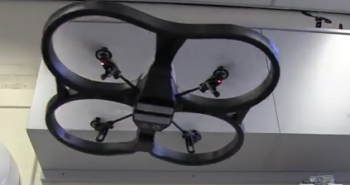British engineers build flying robots ‘copters’ which ‘learn as they fly’
Flying robots that can show true autonomy and even a bit of politeness in working together and venturing into hostile environments are being developed by engineers at the University of Sheffield.
The research paves the way for robots to work intelligently alongside humans in ways that are currently familiar only through science fiction films. The robots could play important roles in crisis situations such as search and rescue missions, or operate in environments where it would be dangerous for humans to work.
Using simple flying robots, called Quadcopters, the team, based in Sheffield’s Department of Automatic Control and Systems Engineering (ACSE), has created software that enables the robot to learn about its surroundings using a forward facing camera mounted at the front of the machine.
The robot starts with no information about its environment and the objects within it. By overlaying different frames from the camera and selecting key reference points within the scene, it builds up a 3D map of the world around it. Other sensors pick up barometric and ultrasonic data, which give the robot additional clues about its environment. All this information is fed into autopilot software to allow the robot to navigate safely, but also to learn about the objects nearby and navigate to specific items.
“We are used to the robots of science fiction films being able to act independently, recognise objects and individuals and make decisions,” explains Professor Sandor Veres, who is leading the research. “In the real world, however, although robots can be extremely intelligent individually, their ability to co-operate and interact with each other and with humans is still very limited.
“As we develop robots for use in space or to send into nuclear environments – places where humans cannot easily go – the goal will be for them to understand their surroundings and make decisions based on that understanding.”
Another key task for these robots is to be able to interact and co-operate with each other without overloading communications networks – a vital ability in emergency situations where networks will already be overloaded.
Programming developed by the team enables the Quadcopters to work out how to ‘politely’ fly past each other without colliding. The robots start off flying at the same altitude and then need to collaborate to work out which robot would fly higher and which would fly lower so they are able to pass.
“The learning process the robots use here is similar to when two people meet in the street and need to get round each other,” explains ACSE research fellow, Dr Jonathan Aitken. “They will simultaneously go to their left or right until they coordinate and avoid collision.”
The researchers used a computer concept called game theory to programme the quadcopters. In this framework, each robot is a player in the game and must complete its given task in order to ‘win’ the game.
If the robots play the game repeatedly they start to learn each other’s behaviour. They can then perform their task successfully – in this case getting past the other robot – by using previous experience to estimate the behaviour of the other robot.
“These simple tasks are part of a major research effort in the field of robotics at Sheffield University,” says Professor Veres. “The next step is to extend the programming capability so that multiple robots can collaborate with each other, enabling fleets of machines to interact and collaborate on more complex tasks.”















